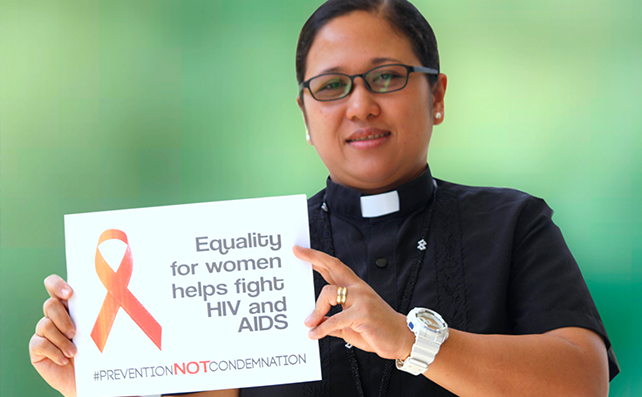In response to the continuing worsening HIV situation in the Philippines, and as part of the #PreventionNOTCondemnation campaign, the National Council of Churches in the Philippines (NCCP) is calling for the inclusion of women in discussions about HIV and AIDS.
While the spread of HIV and AIDS in the country has been categorized by UNAIDS as a concentrated epidemic among key populations such as males who have sex with males (MSM) and people who inject drugs in certain geographic areas, the number of women with HIV has also been increasing. As of December 2014, the Department of Health (DOH) reported a total of 2,098 cases of HIV among women. This is only 9% of the cumulative number of reported HIV infections in the country since 1984.
“In the Philippines, women gave a public face to HIV and AIDS starting in the late 1980s to the 1990s. Dolzura Cortez and Sarah Jane Salazar showed us how women in (sex industry) and mostly wives of overseas contract workers especially seafarers, were highly vulnerable to HIV infection. We are concerned that women living with HIV have been pushed out of focus in the recent years,” said Rev. Rex Reyes Jr. general secretary of the NCCP.
Darlene Marquez-Caramanzana, program secretary on Ecumenical Education and Nurture of the NCCP, added that gender imbalances worsen the impact of HIV and disproportionately subject women to unequal power relations, violence, discrimination and poverty.
“For Filipina women, negotiating condom use with their partners remain a challenge. Women also fear and experience violence and rejection from their partners or husbands, making them reluctant to get tested for HIV. Women as care providers of families also carry the burden of deaths from AIDS. We at NCCP commit to providing a space for both males and females to challenge harmful gender norms to reverse the negative impact on women and girls,” said Marquez-Caramanzana.
The Board of Women’s Work of the United Methodist Church (BWW-UMC), an NCCP member church, already started a partnership with Babae Plus in assisting women living with HIV with their PhilHealth insurance enrollment and other medical expenses.
For Phoebelyn Carreon, HIV program coordinator of the BWW-UMC, there are women-specific needs that existing programs fail to respond to.
“Women living with HIV tell us that finding obstetric and gynecological services in their treatment hubs is a challenge. While antiretroviral medication is provided for free by Global Fund, health services for women are not all the time free or affordable. While we educate our church on HIV and AIDS prevention, we do what we can to raise funds for the needs of women living with HIV, who mostly are unemployed,” Carreon said.
NCCP is eyeing to “continue to empower women and girls in our churches and communities in making informed decisions about HIV. We will ensure to make all relevant facts available to develop their confidence to make or negotiate healthy choices. At the same time, we call on government to address the structural drivers that continue to make women and girls vulnerable. Women and children remain to be among the poorest sectors in Philippine society despite poverty alleviation programs designed for them and in every 16 minutes, one woman or child is battered and in every 53 minutes, one woman or child is raped. If this continues, HIV infection and AIDS related deaths will persist among women and girls,” Marquez-Caramanzana ended.





























































